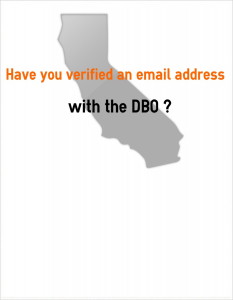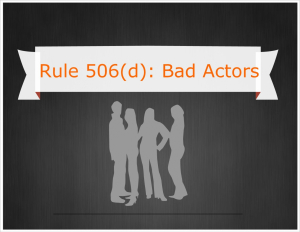Last year, the Securities and Exchange Commission (“SEC”) amended Regulation D of the Securities Act of 1933 (the “Securities Act”), by adding Rules 506(c), 506(d) and 506(e). As we have described previously, there are several considerations and requirements of Rule 506(d). In an effort to further clarify these rules, the SEC’s Division of Corporation Finance publishes updates to the Securities Act Rules Compliance and Disclosure Interpretations (“C&DIs”) section of their website titled Questions and Answers of General Applicability. This resource presents the SEC’s views, general guidance and interpretations of these and other rules adopted under the Securities Act.
Read MoreJacko Law Group Blog
On January 7, 2014, a deferred prosecution agreement was released, describing the settlement between J.P. Morgan Chase & Co. (“J.P. Morgan”) and U.S. prosecutors regarding J.P. Morgan’s compliance failures in its dealings with Bernard Madoff (“Madoff”) and his firm Bernard L. Madoff Investment Securities, LLC.
Read MoreThis month, the Financial Industry Regulatory Authority (“FINRA”) released a regulatory notice reminding member firms of their responsibilities concerning individual retirement account (“IRA”) rollovers and potential conflicts of interest. A conflict exists when brokerage firms have an economic incentive to rollover retirement assets into an IRA sold by the brokers. Consequently, FINRA is reminding brokers that they must evaluate whether it is in the clients best interest to transfer money from the client’s previous 401(k) Plan into an IRA rather, than having a client leave its money in the company plan. Failure to do so could constitute a violation of Rule 2111, relating to FINRA’s suitability rule.
Read MoreAs part of its “Fiscal Year 2013 Agency Financial Report” released by the Securities and Exchange Commission (“SEC”) on December 17, 2013, the SEC discussed how the agency’s new and “more aggressive enforcement actions” fared in 2013. According to the report, the SEC ended the fiscal year of 2013 with 686 enforcement actions, including 402 in the last six months of the year. Furthermore, the SEC stated the resulting disgorgement and monetary penalties arising from these enforcement actions totaled $3.4 billion. This number represents a ten percent (10%) increase from 2012, when monetary penalties from SEC sanctions totaled $3.1billion, and a twenty-two percent (22%) increase from what was seen in 2011. The SEC cited several reasons for this increase, including a more effective examination program, strengthening market structure, and the information obtained by those those in the industry in the form of “whistleblowing” tips. According to the SEC, it received an estimated 3,238 tips during the fiscal year and paid out more than $14 million to whistleblowers for tips received which led to enforcement actions. For more information on whistleblowers, go here.
Read MoreThe Securities and Exchange Commission (“SEC”) recently ordered a cease-and-desist against hedge fund adviser Agamas Capital Management, LP (“Agamas”). The SEC alleged, among other things, that Agamas failed to adopt and implement written compliance policies and procedures as required by Section 206(4) of the Advisers Act and Rule 206(4)-7. The rule requires investment advisory firms to develop a set of policies and procedures reasonably designed to “prevent violations from occurring, detect violations that have occurred, and correct promptly any violations that have occurred.” Although Agamas had policies and procedures in place, they failed to ensure investor disclosures were accurate, and failed to prevent improper discretionary valuation of securities.
Read MoreOn November 22, 2013, the Commissioner of Business Oversight (“Commissioner”) and the California Department of Business Oversight (“DBO”) issued an order affecting all broker dealers and investment advisers (and any other businesses engaged in financial transactions) which are licensed to do business in the State of California. The order requires licensees to establish within their electronic mail system, a dedicated generic email address to receive electronic mail communications from the Commissioner and the DBO. The purpose of this order is to ensure that all licensees can be reached during an emergency and at other times. The Commissioner seeks to take advantage of “modern electronic communication methods” to deliver the same message simultaneously to all or to a select group of licensees of the DBO. The Commissioner and DBO want to be able to depend upon licensees to receive and respond to communications from the Commissioner in a dependable and timely manner. Below are some tips on creating your firm’s designated email address.
Read MoreAs the year comes to a close, it is essential for firms to consider end-of-the-year training programs, both now and throughout 2014. The Securities Industry/Regulatory Council on Continuing Education (the “Council”) recently published their Firm Element Advisory (“FEA”) release for the fall of 2013 which helps identify specific topics of interest for training plans. Listed below are some of the “new” topics mentioned by the Council in its FEA that your firm may want to consider covering in its training plans:
- Alternative Mutual Funds - FINRA issued a new Investor Alert on alternative funds to inform investors considering investing in such funds to be aware of the unique characteristics and risks of these investments. Alternative mutual funds are SEC-registered funds that hold more non-traditional investments and employ more complex trading strategies than traditional mutual funds. It is important to review these complexities with sales personnel.
- SEC Approves Amendments to MSRB Rule G-39 - The SEC approved amendments to the MSRB’s telemarketing rule, MSRB Rule G-39, that expands the scope of the rule to include additional provisions that are substantially similar to FTC rules prohibiting deceptive and other abusive telemarketing acts or practices. Rule G-39 requires brokers, dealers and municipal securities dealers to, among other things, maintain do-not-call lists and limit the hours of telephone solicitations to customer residences.
- Disclosure of Fees in Communications Concerning Retail Brokerage Accounts and Individual Retirement Accounts - FINRA issued Regulatory Notice 13-23 to provide guidance on communications with the public concerning the fees associated with retail brokerage accounts and individual retirement accounts (IRA).
The examples above are just a few highlights of the updates published by the Council to consider when planning for continuing education training. While the FEA can be a useful reference to consider when performing continuing education, it should not be the only resource your firm uses. Continuing education topics should be tailored to the needs of your individual firm. For more information, feel free to contact us at info@jackolg.com or (619) 298-2880.
Read MoreAs a continuation of last week’s entry, this blog focuses on other considerations for general solicitation under Rule 506(d) of Regulation D, including the condition that the issuer takes reasonable care to verify that each person involved in the operation and distribution of the private fund is not a “bad actor.”
According to the Securities and Exchange Commission’s (“SEC’s”) final rule, a “bad actor” is defined as “the issuer or other relevant persons (such as underwriters, placement agents and the directors, officers and significant shareholders of the issuer) that have been convicted of, or are subject to court or administrative sanctions for, securities fraud or other violations of specific laws.”
As a result of Rule 506(d), the “bad actor” disqualification rule, an offering is disqualified from relying on Rule 506(b) or 506(c) of Regulation D if the issuer, or any other person covered by Rule 506(d), are found to be “bad actors.” However, as described by the SEC in its final rule, an exception from disqualification exists for those issuers of an offering who establish that they did not know, and can demonstrate their exercise of reasonable care in that they could not have known, that there was a presence or participation of a “bad actor.” To establish “reasonable care” and rely upon this exemption, the issuer must make a “factual inquiry” into whether any disqualification exists. Evaluation of this standard will be based on the facts and circumstances surrounding the issuer’s inquiry. One potential control is for the issuer to prepare a detailed 506(d) questionnaire identifying those convictions, administrative sanctions and other violations that would lead an individual or firm to be considered a “bad actor,” requiring such persons and entities associated with the offering to attest to any disciplinary activities. The issuer should retain a copy of this completed questionnaire as evidence of a “factual inquiry” into any possible disqualifications.
Additionally, under Rule 506(e), for disqualifying events that occurred before September 23, 2013 (the effective date of the “bad actor” rule), issuers may still rely on Rule 506, but will have to comply with the disclosure provisions of Rule 506(e). This provision requires issuers to provide a written description to purchasers about pre-existing “bad actor” events within a reasonable time before the 506 sale. You can read more about the disclosure requirements here.
For more information about Rule 506(d) as contained in last month’s Legal Tip, please click here, and/or for assistance with the development of your questionnaire, contact us at info@jackolg.com or (619) 298-2880.
Read MoreThis September, the Securities and Exchange Commission (“SEC”) modified Regulation D and created new Rule 506(c), allowing general solicitation and advertising by issuers of private funds pursuant to certain conditions. These conditions require, among other things, that issuers relying on Rule 506(c) take “reasonable steps” in order to verify: 1) that each investor is an “accredited investor;” and 2) that each person involved in the operation and distribution of the fund is not a “bad actor.” In this posting, the first of these requirements will be discussed, with the latter “bad actor” condition to receive further attention in next week’s posting.
Read MoreLast month, the Securities and Exchange Commission’s (“SEC”) Chairwoman Mary Jo White caused a stir within the advisory industry when she issued a speech stating that the SEC will begin zeroing in on “minor infractions” of investment advisers. This past week, Ms. White spoke at the National Society of Compliance Professionals (“NSCP”) National Membership Meeting focusing on how the SEC will approach compliance officers. Ms. White stated that she envisions the SEC to work with compliance officers “to support [compliance officer’s] efforts to create a comprehensive compliance environment within [their] firms,” and that the SEC is “far more interested in helping [compliance officers] succeed before an examination, than we are in catching…a violation in the course of an examination.”
Read MoreLegal Tip Archive
- September 2011 (5)
- April 2014 (5)
- August 2014 (5)
- September 2015 (5)
- August 2011 (4)
- October 2011 (4)
- June 2012 (4)
- July 2012 (4)
- August 2012 (4)
- October 2012 (4)
- November 2012 (4)
- January 2013 (4)
- March 2013 (4)
- April 2013 (4)
- May 2013 (4)
- June 2013 (4)
- September 2013 (4)
- October 2013 (4)
- January 2014 (4)
- February 2014 (4)
- March 2014 (4)
- May 2014 (4)
- June 2014 (4)
- July 2014 (4)
- December 2014 (4)
- January 2016 (4)
- November 2011 (3)
- December 2011 (3)
- January 2012 (3)
- February 2012 (3)
- April 2012 (3)
- May 2012 (3)
- September 2012 (3)
- December 2012 (3)
- July 2013 (3)
- August 2013 (3)
- November 2013 (3)
- December 2013 (3)
- January 2015 (3)
- February 2015 (3)
- March 2015 (3)
- July 2015 (3)
- August 2015 (3)
- November 2015 (3)
- February 2016 (3)
- March 2012 (2)
- February 2013 (2)
- October 2014 (2)
- November 2014 (2)
- April 2015 (2)
- May 2015 (2)
- June 2015 (2)
- October 2015 (2)
- December 2015 (2)
- July 2011 (1)
- September 2014 (1)












